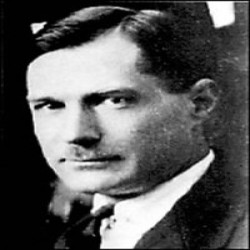
Yevgeny Zamyatin
| Date of Birth | : | 01 Feb, 1884 |
| Date of Death | : | 10 Mar, 1937 |
| Place of Birth | : | Lebedyan, Russia |
| Profession | : | Russian Author |
| Nationality | : | Russian |
Yevgeny Ivanovich Zamyatin sometimes anglicized as Eugene Zamyatin, was a Russian author of science fiction, philosophy, literary criticism, and political satire.The son of a Russian Orthodox priest, Zamyatin lost his faith in Christianity at an early age and became a Bolshevik. As a member of his Party's Pre-Revolutionary underground, Zamyatin was repeatedly arrested, beaten, imprisoned, and exiled. However, Zamyatin was just as deeply disturbed by the policies pursued by the All-Union Communist Party following the October Revolution as he had been by Tsarist policy. Due to his subsequent use of literature to both satirize and criticize the Soviet Union's enforced conformity and increasing totalitarianism, Zamyatin, whom Mirra Ginsburg has dubbed "a man of incorruptible and uncompromising courage," is now considered one of the first Soviet dissidents. He is most famous for his highly influential and widely imitated 1921 dystopian science fiction novel We, which is set in a futuristic police state. In 1921, We became the first work banned by the Soviet censorship board. Ultimately, Zamyatin arranged for We to be smuggled to the West for publication. The outrage this sparked within the Party and the Union of Soviet Writers led directly to the State-organized defamation and blacklisting of Zamyatin and his successful request for permission from Joseph Stalin to leave his homeland. In 1937 he died in poverty in Paris. After his death, Zamyatin's writings were circulated in samizdat and continued to inspire multiple generations of Soviet dissidents.
Early life
Zamyatin was born in Lebedyan, Tambov Governorate, 300 km (186 mi) south of Moscow. His father was a Russian Orthodox priest and schoolmaster, and his mother a musician. In a 1922 essay, Zamyatin recalled: "You will see a very lonely child, without companions of his own age, on his stomach, over a book, or under the piano, on which his mother is playing Chopin. Zamyatin may have had synesthesia since he gave letters and sound qualities. He saw the letter as having pale, cold and light blue qualities. He studied engineering for the Imperial Russian Navy in Saint Petersburg, from 1902 until 1908. During this time, Zamyatin lost his faith in Christianity, became an atheist and a Marxist, and joined the Bolshevik faction of the Russian Social Democratic Labour Party.
Death and burial
Yevgeny Zamyatin died in poverty of a heart attack on 10 March 1937. Only a small group of friends were present for his burial at the Cimetière de Thiais, in the Parisian suburb of the same name. One of the mourners, however, was Zamyatin's Russian language publisher Marc Lvovich Slonim, who had befriended the Zamyatins after their arrival in the West. His death was unreported in the Soviet press.
Quotes
True literature can exist only where it is created, not by diligent and trustworthy functionaries, but by madmen, hermits, heretics, dreamers, rebels, and skeptics.
It is an error to divide people into the living and the dead: there are people who are dead-alive, and people who are alive-alive. The dead-alive also write, walk, speak, act. But they make no mistakes; only machines make no mistakes, and they produce only dead things. The alive-alive are constantly in error, in search, in questions, in torment.
Explosions are not comfortable.
Heretics are the only bitter remedy against the entropy of human thought.
You're in bad shape. It looks like you're developing a soul.
I prefer being wrong in my own way to being right in someone else's.
Those two, in paradise, were given a choice: happiness without freedom, or freedom without happiness. There was no third alternative.
You're in a bad way! Apparently, you have developed a soul.
There is no final one; revolutions are infinite.
If we have no heretics we must invent them, for heresy is essential to health and growth.
